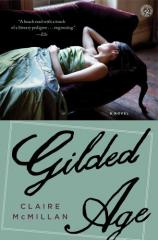Gilded Age
Review
Gilded Age
2012 is the 150th anniversary of Edith Wharton's birth, but she sure seems as timely as ever, thanks to a crop of new books being published this year. There's a novel (THE AGE OF DESIRE by Jennie Fields) based on the life of Wharton herself, and two debuts offer creative modern-day re-imaginings of her most famous works: THE AGE OF INNOCENCE, reset amid London's Jewish community in Francesca Segal's THE INNOCENTS, and THE HOUSE OF MIRTH, imaginatively (and more than a little surprisingly) set in Cleveland's wealthy society in Claire McMillan's GILDED AGE.
"McMillan remains true to Wharton's novel even as she effectively satirizes an exclusive community and simultaneously satisfies people's thirst to read about how the other 1% lives."
"Nothing is more usual than Clevelanders of a certain ilk leaving, seeing the world, and then dragging a spouse back to settle down," writes the unnamed narrator of McMillan's novel. She should know --- she's a young wife expecting her first child, who's recently brought her young husband Jim --- himself a native Southerner --- back to Cleveland to raise their family. She has no problem reintegrating with Cleveland society, most of whom she's known since childhood --- including her first love, "Cinco" Van Alstyne, whose marital bliss seems just a tad too blissful to be believed, at least by our jealous narrator.
The narrator's oldest friend, Ellie Hart, also returns to Cleveland after years of "seeing the world." But Ellie doesn't come back to Cleveland with a beaming spouse and a happy marriage; instead, she returns in disgrace following a high-profile divorce (with an iron-clad prenuptial agreement) and a stint in rehab for an unspecified vice. Ellie has one goal in mind when she returns to the viper pit of Cleveland high society: to marry, and to marry well. Making it as a career woman has never been Ellie's style; her only hope --- at least as far as she sees it --- is to find someone who is willing to keep her in the style to which she became accustomed during her privileged childhood in Cleveland and, later, during her marriage.
But if Ellie wants to go about ingratiating herself to the eligible men of Cleveland's inner circle, she might not be going about it in quite the right way. Her smoking and drinking don't sit right with idealistic vegan outdoorsman P. G.; her forward attitude and sexual exploits aren't appealing to sexy poet Selden; and she even manages to alienate Randall LaForte, the man who, on paper at least, is probably her ideal match. Even as she clumsily makes her first forays back into Cleveland society, she certainly doesn't endear herself to society women when she flirts with their husbands.
Anyone who has read THE HOUSE OF MIRTH knows not to expect a happy ending for poor Ellie Hart; in fact, those who will savor GILDED AGE most will be those familiar with Wharton's original, who will enjoy identifying the ways in which McMillan cleverly plays with plot and character, as well as noting which elements of Wharton's masterpiece she chooses to preserve.
The voice of the narrator --- judgmental and, in some cases, even hypocritical --- seems in many ways like a throwback to the early 20th century of THE HOUSE OF MIRTH, as does the conservatism and, at times, downright prudishness of the narrator's social circle also seems anachronistic. That said, McMillan remains true to Wharton's novel even as she effectively satirizes an exclusive community and simultaneously satisfies people's thirst to read about how the other 1% lives.
Reviewed by Norah Piehl on June 22, 2012
Gilded Age
- Publication Date: February 12, 2013
- Genres: Fiction
- Paperback: 272 pages
- Publisher: Simon & Schuster
- ISBN-10: 145164048X
- ISBN-13: 9781451640489





